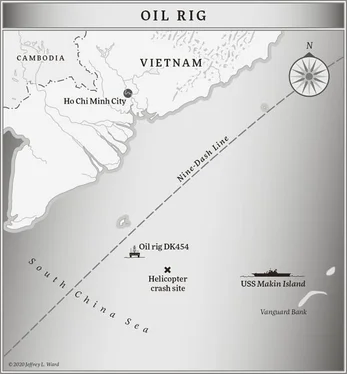Medina Tohti stood on the bank until Mamut was out of sight, swallowed up by the darkness of Kanas Lake.
“You are fortunate you have my daughter,” she said under her breath.
“She’s not a hostage,” Chavez reminded her. “We only wanted you to know she is safe.”
Medina considered this for a moment, and then started up the bank without looking back. “You are fortunate nonetheless.”
Chavez motioned the group after her, wanting to vacate the area as soon as humanly possible.
The vague lawnmower hum suddenly grew louder, bursting into the clearing as a Hughes OH-6 Cayuse (Little Bird or Killer Egg), skimmed in at treetop level and descended toward the grass, thirty meters away. Commonly called a “Loach” for its designation as a Light Observation Helicopter, or LOH, in Vietnam, the egg-shaped chopper was completely blacked out with both pilots wearing NVGs. Absent the thumping roar of a normal helicopter, the Loach was so quiet that Chavez hadn’t heard it at all until moments before its arrival. Even then, it had been impossible to tell from which direction it came until an instant before it cleared the trees. Closer inspection revealed it had several modifications from a regular Loach—an extra main rotor blade, four tail rotor blades instead of two, a large baffled muffler under the tail boom. An infrared camera the size of a bowling ball hung off the bird’s nose, imperative for guiding the pilots as they navigated narrow canyons and craggy mountain passes with no running lights. This one, an MH-6 variant, had two horizontal platforms resembling black boogie boards, one on each side at the base of the doors like stubby wings.
“Looks awfully small,” Chavez said as they helped carry Lisanne’s blanket roll across the grassy hummocks.
“There were supposed to be two,” Yao said, floundering in the spring mud, grunting in his effort to keep his corner of Lisanne’s blanket roll straight and level. “We brought them in on a C-130. That last phone call on the boat was to tell me one of them had crapped out after it was off-loaded, leaving us with limited space for an evacuation. I’m not sure what the problem was, but I thought I might have to see you guys off and then hoof it back to the village—blend in, adapt, overcome, that kind of shit.”
Chavez chuckled despite the situation. “Two is one and one is none,” he said—one of Clark’s favorite quotes. “We’ll fit. If these guys are like the Loach pilots I know, they’d strap us to the skids before they left one of us behind.”
Yao turned as he walked, head to one side. “Hmmm. Don’t be too sure. Their mission is to get Medina back. The rest of us are expendable.”
The MH-6 copilot leaned out of the left-side door, waving them forward.
“Let’s go! Let’s go! Let’s go!” He tapped his headset. “Multiple aircraft heading this way from the south at a high rate of speed. ETA eight minutes.” He twisted in his seat, pointing east. “We need to be behind that mountain in six.”
“Copy that!” Chavez helped feed Lisanne into the side door while he listened for further instructions.
“We took the seats out in the back, so you’ll go four on the floor,” the copilot continued. He pointed to Chavez and Ryan with a knife hand. “You and you buckle in on the outside platforms for balance. There are a couple of parkas in the back to keep you from freezing your asses off!”
The pilot took his left hand off the collective long enough to wave it in a circle over his helmet. “Let’s haul ass!”
Lisanne went in first, followed by Adara, who refused to leave her side, and then Medina. Yao made sure they were harnessed in. Chavez did one last quick-check of his team before turning and securing his own harness. The copilot watched like a hawk, and the moment Chavez’s buckle snapped into place, he turned and gave a thumbs-up.
Chavez glanced at his watch as the Loach lifted off, pirouetting as it rose to point its nose to the east. Less than four minutes to cross the trees and reach the shadow of the next valley. As if the pilot read his mind, the chopper’s engine grew louder and its nose dipped, shooting forward toward the mountains. Chavez looked back one last time, to see the feeble beam from Mamut’s boat moving north across the black void of Kanas Lake.
In addition to the other stealth components, this CIA Quiet Loach also appeared to be covered with a rubberized, radar-absorbing skin. Even so, the pilots were flying NOE—nap of the earth—winding their way through valleys, mere feet above the ground. They followed rivers when they could, grassland or gravel, and rose just above the trees when they had to, always maintaining their speed. Several times, Chavez felt freezing spray from groundwater sting his skin or thought he might drag his boots on a treetop—but the pilots kept him just out of reach. He tried to turn and check on his friends, to see how Lisanne was holding up, but bitter, hurricane-force winds forced him to keep his head down, buried in the parka. Caught up in the urgency of an immediate departure, he’d made the rookie mistake of forgetting to pull the zipper up as far as it would go before takeoff. Buffeted by the wind, the metal button on his collar began to slap him repeatedly in the ear—taking him back to the first time he’d flown on one of these birds, a loose strap on his ruck slapping him silly in the wind. He thought of his son and what that kid had in store for him—and for some reason, it made him feel very old.
As the crow flies, the Little Bird’s point of departure at Kanas Lake was just over thirty miles from the Mongolian border. The pilots cheated northeast to stay below radar. It took them a mile out of the way through a pass that got them over the first line of snowcapped Altay peaks. At this point, the Mongolian border was only ten miles away. Instead of continuing east, the pilots took the little chopper south into a long valley, adding almost twenty miles to their trip, but avoiding a suspected radar site at the triple frontier where the borders of China, Russia, and Mongolia came together.
Twenty-five minutes after liftoff, the copilot reached down to where Chavez sat on the platform less than a foot away, and gave him a thumbs-up, signaling that they were out of Chinese airspace. Chavez breathed a sigh of relief, slumping against his harness. The mountains quickly gave way to steppe and the ground beneath was generally treeless and rolling. It was still bitter cold outside the chopper, but the clouds had cleared once they’d passed through the mountains, revealing why, once the sun came up, Mongolia would live up to its nickname of Land of the Eternal Blue Sky. Ten minutes after that, the MH-6 turned on its landing lights. Three large trucks were parked facing one another on a deserted gravel road with their headlights forming a makeshift landing zone. They looked like they might be Deuce and a Halfs, but Chavez’s eyes teared so badly from the wind that he could hardly see.
Landing was anticlimactic, since they weren’t quite as worried about someone trying to kill them.
A Mongolian military officer and two young men Chavez assumed were with CIA air ops helped everyone off the chopper except Lisanne and Adara. Two docs from the Mongolian military climbed in with the women. She was still in and out of consciousness, but alive—for now. The docs looked incredibly grim and pounded on the pilot’s seat to get him to go.
One of the hazards of covert missions was that they often had to remain covert during rescue or medical emergencies. The circle of people who even saw the stealth helicopter was already too large and Yao was stretching the limits directing it to fly Lisanne toward the city of Khovd, a hundred and fifty miles to the east. A military ambulance was already on the road to intercept ten miles out of the city, where the two doctors would transfer the patient. A Hawker Air Ambulance would take her the remaining seven hundred miles from Khovd to Ulaanbaatar. It was a testament to how remote they truly were that absent a return to China, the nearest trauma hospital of consequence was nine hundred miles from where they now stood. Even with a cursory glance at her wounds, the surgeons were astounded that Lisanne had not already bled to death. If she did live, the odds were against her keeping the injured arm. Jack and Adara both wanted to go with her, but there was barely enough room for one with their medical equipment. Adara’s training won out, and she remained on the chopper, cradling Lisanne’s torso on her lap.
Читать дальше











![Александр Ирвин - Tom Clancy’s The Division 2. Фальшивый рассвет [litres]](/books/417744/aleksandr-irvin-tom-clancy-s-the-division-2-falsh-thumb.webp)
